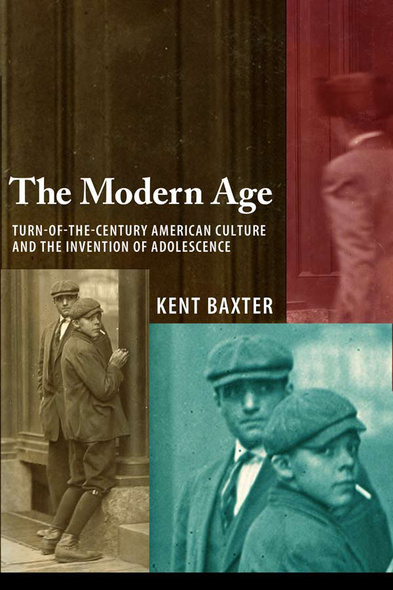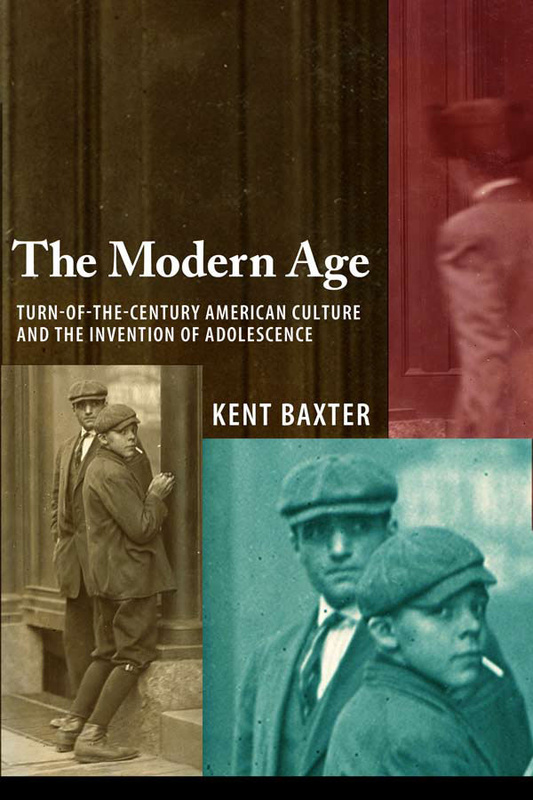The Modern Age
Turn-of-the-Century American Culture and the Invention of Adolescence
The Modern Age examines the discourses that have come to characterize adolescence and argues that commonplace views of adolescents as impulsive, conflicted, and rebellious are constructions inspired by broader cultural anxieties that characterized American society in early-twentieth-century America.
The idea of adolescence, argues Kent Baxter, came into being because it fulfilled specific historical and cultural needs: to define a quickly expanding segment of the population, and to express concerns associated with the movement into a new era. Adolescence—a term that had little currency before 1900 and made a sudden and pronounced appearance in a wide variety of discourses thereafter—is a “modern age” not only because it sprung from changes in American society that are synonymous with modernity, but also because it came to represent all that was threatening about “modern life.”
Baxter provides a preliminary history of adolescence, focusing specifically on changes in the American educational system and the creation of the juvenile justice system that carved out a developmental space between the child and the adult. He looks at the psychological works of G. Stanley Hall and the anthropological works of Margaret Mead and explores what might have inspired their markedly negative descriptions of this new demographic. He examines the rise of the Woodcraft Indian youth movement and its promotion of “red skin” values while also studying the proliferation of off-reservation boarding schools for Native American youth, where educators attempted to eradicate the very “red skin” values promoted by the Woodcraft movement.
Finally Baxter studies reading at the turn of the century, focusing specifically on Horatio Alger (the Ragged Dick series) and Edward Stratemeyer (the Tom Swift, Nancy Drew, and Hardy Boys series) and what those works reveal about the “problem” of adolescence and its solutions in terms of value, both economic and moral.
Building on Joseph Kett's idea (articulated in Rites of Passage, CH, Oct'77) that adolescence is more than a physical stage of life--that it was, indeed, a purposeful social and cultural 'invention'--Baxter (English, California State Univ., Fullerton) brings depth and concreteness to the issue. The author focuses on the late-19th and early-20th centuries to examine the concept of an invented adolescence as it was not only theorized by G. Stanley Hall and Margaret Mead but also manifested in the juvenile courts, Indian boarding schools, Woodcraft and scouting organizations, and books by Horatio Alger and Edward Stratemeyer (author of Hardy Boys and Nancy Drew titles). Baxter argues persuasively that these were instruments for control and rehabilitation of a teenage population deemed dangerous if left to its own devices. He disputes the reality behind the charge and claims that adolescence was created to assuage anxieties about urbanization, industrialization, and other aspects of modernization. The protagonists and texts of this drama will be familiar to historians, but Baxter is a skillful reader and his judicious, revealing interpretations will stimulate those interested in the treatment of adolescence as ideology. Summing Up: Recommended. Upper-division undergraduates, graduate students, and faculty.'
—CHOICE
'This is a rousing and medicinal book, brilliantly conceived and argued with rare sensitivity and an eye toward what we always suspected: that there was something both necessary and deeply wrong about ‘the adolescent.’ Kent Baxter shows how we created this ‘adolescent,’ a strange construction made necessary by a confluence of cultural needs and a general turn-of-the-twentieth-century hysteria. We still all live with this energized monster, the teenager, who so often plays out the script handed to him or her: tempestuous, rebellious, a walking Id. Baxter has enormous gifts as a theorist and a writer.'--James R. Kincaid, Aerol Arnold Chair in English and Professor of English at the University of Southern California
Kent Baxter is Assistant Professor of English at California State University, Northridge.





